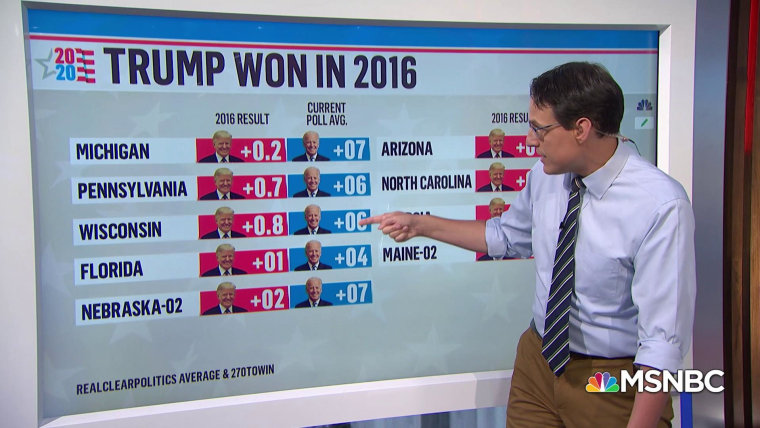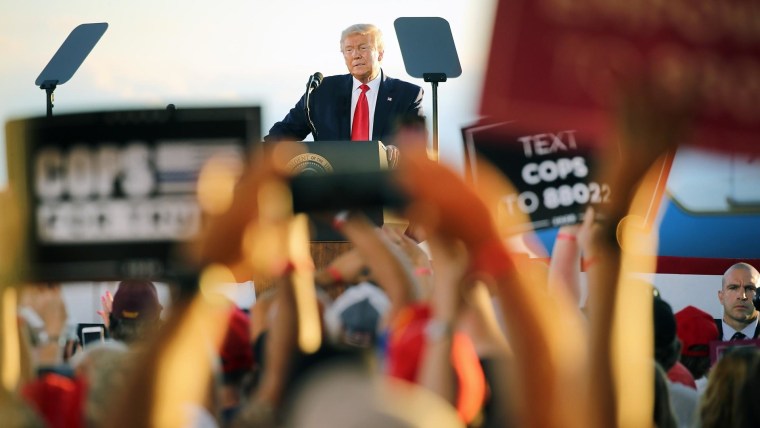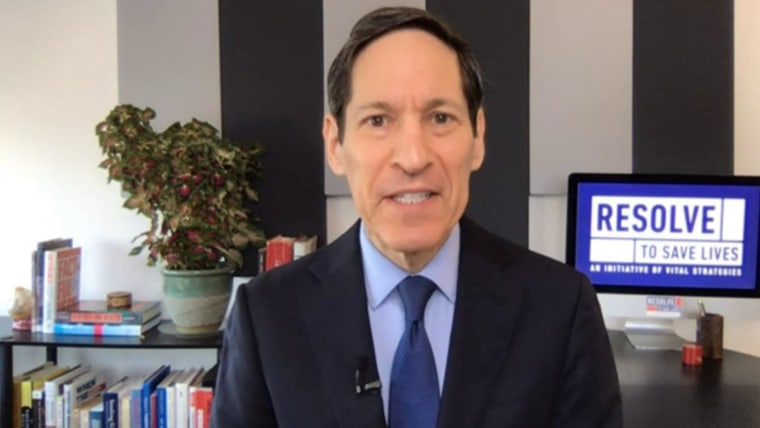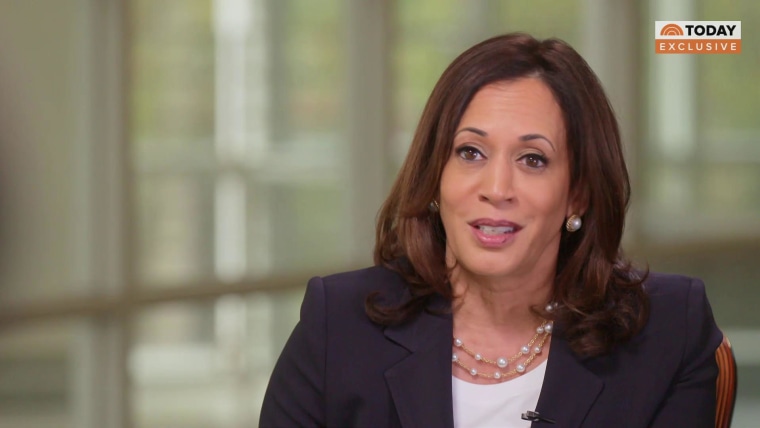WASHINGTON — The 2020 election is Joe Biden's to lose as he continues to hold a lead over President Donald Trump coming out of the Democratic and Republican conventions, which mark the start of the fall campaign.
But the future is unknowable. Data has its limits. Surprises happen. The world can change quickly, as anyone who lived through the 2016 election or the first eight months of 2020 knows.
The country remains deeply polarized along a roughly 50-50 partisan split. Biden and Trump allies both agree the outcome will likely be closer than the polls currently suggest as voters increasingly feel the tug of partisan magnets.
Here's what we know and, importantly, what we don't know two months before Nov. 3.
What the polls say — and what they don't
The state of the race is easy to summarize right now: The data says Biden should win.
While it's too early to tell if the conventions changed the race, the RealClearPolitics average of polls has Biden up about 7 percentage points nationally and about 3 percentage points, on average, across six key battleground states: Pennsylvania, Michigan, Wisconsin, Florida, North Carolina and Arizona.
Trump has trailed in head-to-head matchups with Biden since pollsters first started measuring it in 2019, and his approval rating has been underwater since almost the first day of his presidency (meaning more people disapprove of him than approve). And Biden's lead is bigger than Hillary Clinton's was at this point in 2016.
The Economist's statistical forecast model gives Biden a roughly 9-to-1 chance of winning. FiveThirtyEight's has Biden winning 69 out of 100 times. The Princeton University Election Consortium projects the former vice president winning 349 electoral votes (he needs 270). And longtime forecaster Alan Abramowitz, using a completely different system, gives Biden a 70 percent chance.
But models are just theories about how the future will play out based on historical data. The theories can be wrong. The data could be useless if this year's election is substantively different from historical ones.
No poll or forecast can take into account real-world events, like the course of the coronavirus pandemic over the next two months or a potential health scare from the two septuagenarian presidential candidates.
The polls pretty much nailed the national popular vote in 2016, but they missed a late swing for Trump in battleground states and underestimated his support from non-college-educated whites. While a swing of a few thousand votes can tip a key state, it's usually not enough to register in polls.
Patrick Murray, the director of the respected Monmouth University Poll, said when friends and family members ask him what will happen in the election, he responds, "My crystal ball is in the shop."
But we do know a few things that are different from 2016.
Trump is now president and more people's minds are made up. Third-party protest candidates are gaining less traction. Biden's lead is bigger than Clinton's, and, unlike Clinton, he's ahead with voters who dislike both candidates.
"We have far fewer undecided than we did four years ago and a lot less room for movement," Murray said. "But there's still enough room to thread the needle, which is exactly what happened four years ago, so you can't discount any outcome."
The ways Trump can win
Unlike 2016, no one doubts Trump could win this year.
The president could persuade suburban voters who defected during the 2018 midterms that Democrats are too dangerous. He could bring in new voters among the white working class, which make up a majority of the Americans who do not generally vote in key states. Voters still trust Trump more on the economy, and they may conclude he's better equipped to lead the recovery.
"The convention was designed to give upper-middle-class voters permission to support the president," said Dan Eberhart, a major conservative donor and Trump ally. "The message was that the Trump administration is inclusive and is addressing the concerns of minorities and immigrants. Those testimonials were aimed at those undecided voters who may not like Trump’s personality but don't like the policies of the left."
"As long as Democrats continue to ignore the concerns of half the country, they are going to have trouble winning national elections," he added.
Trump now commands the mighty powers of the presidency and is not afraid to use them for his personal political gain, regardless of the law: He pardoned Alice Johnson, who spoke at the GOP convention, the day after the RNC ended. He could try to push a vaccine to market or do something much darker.
Most analysts agree that the Electoral College gives Trump an edge, since it advantages smaller states (which tend to be redder states) over big ones. After all, 2.8 million more Americans voted for Clinton than Trump in 2016, but he still won the presidency thanks to the Electoral College. He could do that again.
Defining issues
The pandemic and ensuing recession have become one intertwined and all-encompassing crisis, swallowing everything from the economy to schooling, sports, health care and racial justice.
Republicans attempted to put the coronavirus and its job-killing impact on the economyin the rearview mirror during their convention, but voters overwhelmingly disapprove of how Trump has handled the crisis and have dim views about the trajectory of the country and the economy.
"There was a certain element of denying the undeniable in the treatment of the pandemic," Whit Ayers, a top Republican pollster, said of the GOP convention. “But at this point, the pandemic and the president's leadership are overwhelmingly top of mind for most voters."
Could a vaccine arrive earlier? Does the number of cases come down? Does the economy rebound despite the virus? Can Trump successfully rewrite history and convince enough Americans he did everything right to control the virus and that it's no longer a threat?
Meanwhile, Trump made clear he wants to focus on law and order and tie Biden to the riots and looting that have broken out during some protests demanding racial justice.
In Wisconsin, a critical state, positive views of the Black Lives Matter movement fell significantly between June and August, while positive views of the police ticked up.
In June, 59 percent of Wisconsin registered voters had a favorable view of Black Lives Matter, while 27 percent had an unfavorable view, according to a Maquette Law School poll of the state. The August survey, which was conducted before the Kenosha unrest, found support notched down to 49 percent while disapproval went up to 37 percent, with significant movement among white independents.
While it's not yet clear how views on Black Lives Matter influence voters' feelings towards Biden, it's the only other issue getting much attention during the pandemic.
"Increasingly widespread violence in our cities that Democrats fail to condemn vociferously enough and fail to quash has the potential to upend the race, which up to this point has been remarkably stable," Ayers said.
Cash is king
Money isn't everything, but it helps candidates get their message out and define their opponent, especially when it's difficult to campaign in person.
Trump has been raising money for his campaign since his last one and has broken several records. His campaign has out-raised Biden by almost $100 million — $415 million to $321 million — as of the end of July.
But Democrats are catching up with a huge flood of cash in recent months that is only expected to increase, raising over $70 million during the Democratic convention and $48 million around Kamala Harris' selection as vice president. Outside groups have also been helping narrow the gap, spending $148 million on behalf of Biden to the $90 million spent on behalf of Trump, according to Open Secrets.
Democrats are nothing if not an anxious bunch, and the 2016 election left such a mental scar that many are now conditioned to assume they'll somehow blow it again and snatch defeat from the jaws of victory.
"We absolutely must have urgency as we approach this election; nothing is in the bag. But veering toward despondent anxiety is unhealthy," said Ian Sams, a veteran of Clinton's and Harris' presidential campaigns. "2020 is not 2016, and Donald Trump now owns his record as president."
What's next?
The biggest foreseeable events between now and Election Day are the presidential debates, which will take place on Sept. 29 in Cleveland, Oct. 15 in Miami and Oct. 22 in Nashville, Tennessee. Vice President Mike Pence is also scheduled to debate Harris on Oct. 7 in Salt Lake City.
Despite speculation that either Trump or Biden would refuse to debate, both have said they look forward to the debates and are planning to attend.
Election "Day" will likely look very different this year, with tens of millions of Americans expected to vote early or by mail to avoid crowded polling places during the pandemic. Voting in some key states starts as early as September, and it could take longer to count mail ballots, meaning we may not know the winner on election night.
"lose" - Google News
August 31, 2020 at 12:46AM
https://ift.tt/2G3Jxtg
It's Biden's to lose (and he still could): The state of the race after the conventions - NBC News
"lose" - Google News
https://ift.tt/3fa3ADu https://ift.tt/2VWImBB
Bagikan Berita Ini


















0 Response to "It's Biden's to lose (and he still could): The state of the race after the conventions - NBC News"
Post a Comment